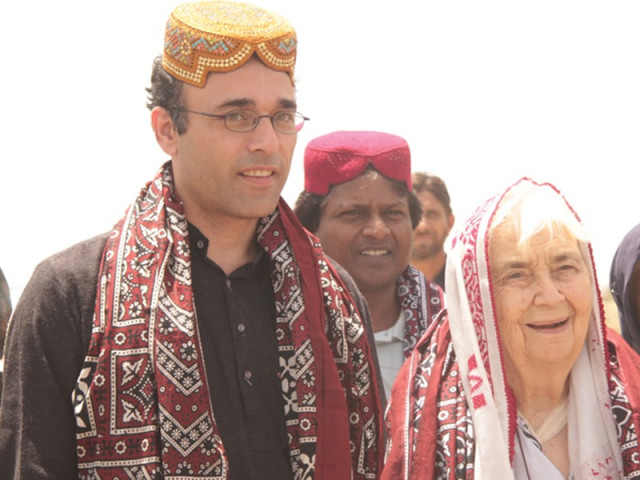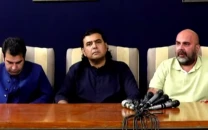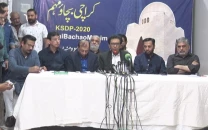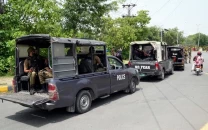After the floods: How one woman’s refusal to go to the city rebuilt one village
Lalan of Jatti was dying of thyroid cancer when a MALC official urged her to seek help.

The village of Jatti is blessed, at least in some regards. Out of 27 families, nobody drowned in the flood. And now a long lost nearly native son, Martin Van Camp, has come from Belgium, cheque book in hand, to build them permanent houses — houses that, unlike their original mud and wood homes, will withstand the raging waters, should they come again. And though they can’t explicitly tell him in any tongue he understands, the people of Jatti are hopeful, grateful and eager to rebuild their lives.
As soon as Van Camp stepped out of the white Toyota pick-up on Wednesday, Gullan Mallah came forward, holding out a traditional Sindhi topi. Amni, Gullan’s aunt and the eldest woman in the village, was right beside him, light eyes sparkling and henna-dyed hair peeking out from beneath a purple dupatta as she draped the unique block-printed and indigo dyed ajrak scarf around Van Camp shoulders. She took both of his hands, squeezing them tight. As the rest of the men greeted him, children clustered around, the bolder ones sidling up and offering tiny, sticky hands.
Van Camp was clearly overwhelmed. His wide grin crinkled the corners of his moist eyes. He was silent for several minutes, smiling, nodding and pressing palms. When he trusted himself to speak, he said, “Their happiness makes it so worthwhile.”
Van Camp’s maternal great-grandfather, Laurenco Caetano Duarte, built Duarte Mansions, the first apartment building in Karachi, in the early 1800s. In the mid-50s, his father, a carpenter by trade, came to Karachi to help found a branch of the Young Christian Workers Association. Now, although more indirectly, Van Camp takes his place in this community, building lineage, both literally and figuratively.
But without the guidance of the Marie Adelaide Leprosy Centre (MALC) and a former Jatti resident, Lalan Mallah, there would have been no celebration Wednesday morning.
Venu Gopal, the regional coordinator for the MALC, met Lalan in Badin, where she and other Jatti residents lived as internally displaced persons. Gopal encouraged the residents to return to their land, but he had a special request for Lalan — would she please come to Karachi and seek treatment for her thyroid cancer?
“It was four months past the flood, and we were worried that people were going to take their land,” said Gopal. The families of Jatti collectively own 150 acres where they grow rice, wheat, sugarcane and sunflowers. Lalan refused to come to Karachi, so Gopal brought in the one person he thought could persuade the elderly lady - Dr Ruth Pfau, an 81-year-old German nun and medical doctor who’s been working with MALC for 52 years.
Shortly after the villagers returned to Jatti, Dr Pfau visited Lalan.
“She said she was comfortable, she didn’t like city life, she didn’t want to leave,” said Pfau. Lalan seemed content to be home again. No one suspected that she would die the next day.
But Lalan led the MALC to Jatti, and once they saw the overwhelming need — nothing was left of the village but a one-room schoolhouse — they decided to get involved. Lalan was Gullan’s mother and it is in honour of her memory, that he volunteered to liaise between the NGO and the villagers.
Meanwhile, Van Camp was in Belgium, busily spearheading a one-man fundraising campaign for flood survivors in a country that felt like home, despite the fact that he first saw the place at age 28. He emailed everyone he knew, he went to schools and talked about the people he’d met and the hospitality and generosity he’d felt during earlier visits to Pakistan. Through lunch money and other donations, he collected 13,000 euros.
“I needed to make sure that the money reached the right people,” Van Camp said.
Van Camp contacted the MALC when he first came to Karachi in 1995. Thirty years earlier, his father, a skilled photographer, had volunteered his services. MALC needed pictures in order to raise funds and awareness.
“He went around the slums with us, the places leprosy was spreading, and photographed the leprosy patients,” said Dr Pfau. “Most people weren’t willing to even get close to leprosy patients at that time.” In 1996, due to work by MALC and other groups, the World Health Organisation declared leprosy under control in Pakistan.
Van Camp knew he could trust Dr Pfau. He gave the money to the MALC.
“It was perfect,” said Gopal. MALC was funding other projects, but the money was exactly the amount needed for the first part of the Jatti project — building a dozen 14-by-16 feet brick houses. So the money went towards building supplies. The families did the majority of the work themselves, and they have agreed to double up in the houses until, with the MALC’s help, they could generate funds for a dozen more.
Amni and Dr Pfau linked hands, and Amni led the honoured guests to one of the new homes. The smell of fresh paint mingled with the heady smoke from cookfires, as the home filled with people. The houses are beautiful and spotless with green wooden shutters and reflective, crème interiors. Sherbana, a shy teenager, stands in the far corner, surveying the room. She tugs her orange dupatta over her face, but she’s not quick enough to hide the brilliant flash of a smile. This is her new home.
Later, everyone escaped the midday heat, lounging on cots under the porch of the brick school. After sharing small blue mugs of chai, Dr Pfau removed her shoes and leaned against a couple of pillows, curling her knees to her chest. In no time, she was dozing.
The conversation, about how they had an occasional teacher prior to the flood and no teacher after, continued in whispers. Paulus Mohan, a volunteer lab technician for MALC, is currently searching for a local teacher. Because he’s employed by the government, he played a major role in helping MALC gain permission to work in Jatti.
Van Camp turned to Mohan. “Please tell him,” Van Camp indicated to Gullan with a smile, “how much I appreciate his help and how happy I am to be here.” Van Camp’s enthusiasm and his position — leaning forward, cross-legged in the middle of the cot — made him seem almost childlike.
Paulus relayed the message and Van Camp and Gullan shared what must be their twentieth handshake of the afternoon. Gullan tried to persuade Van Camp to stay for lunch, but Dr Pfau was beginning to stir.
“Next time,” Van Camp replied. “I’ll stay for lunch when I come with my family.”
Van Camp and his wife Else have a four-year-old daughter named Hannah. Gullan’s daughter, Sugran, a cheerful girl with sun-bleached hair and a hot pink shalmar kameez, is about the same age. Perhaps Hannah Van Camp will come to Pakistan or perhaps the girls will never get an opportunity to play together. But for a few minutes, two proud fathers sipped chai and celebrated Lalan’s last gift to her son, their joint gift to Jatti and how their lives are now irrevocably intertwined.
The writer is a graduate of Columbia University’s Journalism School and a fellow for The Express Tribune. She writes about art and culture for Juxtapoz magazine and blogs at chereefranco.wordpress.com
Published in The Express Tribune, April 21st, 2011.



















COMMENTS
Comments are moderated and generally will be posted if they are on-topic and not abusive.
For more information, please see our Comments FAQ